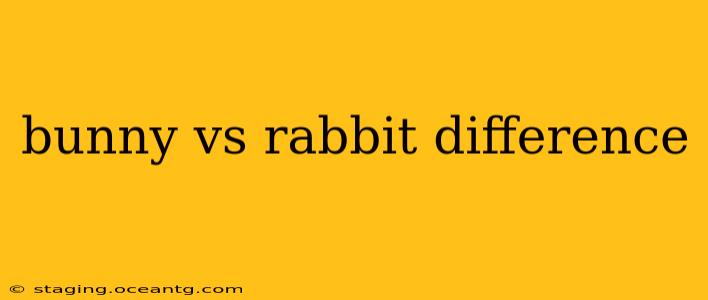The terms "bunny" and "rabbit" are often used interchangeably, leading to confusion about whether there's a real difference. While the distinction isn't strictly scientific, there are subtle yet important differences in how we use these words and the connotations they carry. This article will delve into these nuances, answering common questions and clarifying the often-blurred lines between these two terms.
Are bunnies and rabbits the same thing?
Essentially, yes. A bunny is simply an informal, often endearing term for a young rabbit. Think of it like "kitty" versus "cat"—both refer to felines, but "kitty" suggests a younger, cuter animal. There's no biological classification that separates "bunnies" and "rabbits." The distinction lies primarily in usage and context.
What is the difference between a bunny and a rabbit in terms of age?
The main difference lies in the age and the perception of the animal. "Bunny" is almost exclusively used to describe a young rabbit, while "rabbit" can refer to rabbits of any age. However, the cutoff for "bunny" is subjective; some might consider a rabbit a "bunny" until it reaches sexual maturity, while others might use it only for the earliest stages of a rabbit's life.
What are the different types of bunnies/rabbits?
There's a huge variety of rabbit breeds, each with its unique characteristics in terms of size, coat, and temperament. Some popular breeds include:
- Dutch Rabbit: Known for its distinctive markings.
- Lionhead Rabbit: Characterized by its fluffy mane.
- Netherland Dwarf Rabbit: One of the smallest rabbit breeds.
- Flemish Giant Rabbit: A very large breed, as the name suggests.
- Angora Rabbit: Famous for its long, luxurious fur.
This list merely scratches the surface; dozens of other fascinating breeds exist. Breed-specific care requirements vary, so responsible pet ownership involves researching the needs of the specific breed you choose.
Are all bunnies rabbits, but not all rabbits are bunnies?
Yes, this statement accurately reflects the relationship between "bunny" and "rabbit." All bunnies are rabbits, but only young rabbits are typically called bunnies. The term "bunny" implies youth and often carries a sense of cuteness.
What is the life expectancy of a rabbit?
The lifespan of a rabbit varies significantly depending on the breed, diet, and overall care. Generally, domestic rabbits can live for 8-12 years, with some living even longer with proper care.
What is the best way to care for a rabbit?
Providing proper care for a rabbit involves several key aspects:
- Housing: A spacious, secure hutch or indoor enclosure is essential.
- Diet: A diet primarily consisting of high-quality hay, supplemented with fresh vegetables and a small amount of pellets.
- Socialization: Rabbits are social animals and benefit from interaction and companionship (though not all rabbits enjoy being handled).
- Veterinary Care: Regular veterinary checkups are crucial for maintaining their health.
Responsible rabbit ownership requires considerable research and commitment.
This comprehensive guide clarifies the often confusing terms "bunny" and "rabbit." While the difference is primarily contextual and related to age perception, understanding this nuance improves communication and fosters better care for these beloved animals. Remember, choosing a rabbit as a pet is a significant commitment; thorough research is essential before bringing one into your home.
